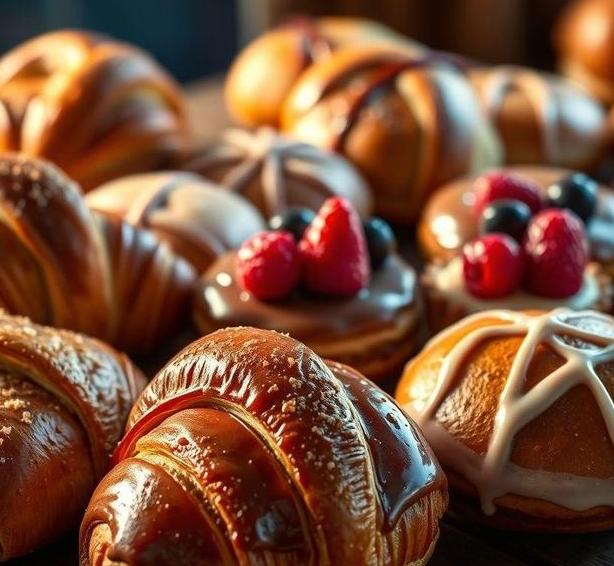Baked goods-freshly made bread, cookies, cakes, muffins, and pastries-are some of the most comforting and delicious treats out there. They fill our homes with warmth and a sweet, irresistible aroma. But as much as we love them, all good things must come to an end, right? And unfortunately, baked goods do not last forever.
Whether you’ve baked a batch of cookies, bought a fresh loaf of bread from your local bakery, or splurged on a fancy cake, knowing how to properly care for and store these delights is crucial for extending their freshness and flavor. But when exactly do they go bad? And how can you tell? Here’s everything you need to know about the shelf life of baked goods, how to store them correctly, and common signs of spoilage. By the end of this guide, you’ll be equipped to keep your baked goods at their best, whether you’re making them yourself or buying them from the store.
Can Baked Goods Go Bad?
Yes, absolutely. Just like any other perishable food item, baked goods can spoil, dry out, or develop unpleasant flavors. Several factors contribute to how quickly they degrade, including ingredients, storage conditions, and the presence of preservatives.
- Moisture Content: Baked goods like cakes, muffins, and some pastries often contain higher moisture levels. Moisture can be a great breeding ground for bacteria and mold, which makes them more susceptible to spoilage.
- Type of Ingredients: Baked goods made with dairy products (milk, butter, cream cheese) or eggs tend to spoil faster than those made with just dry ingredients.
- Temperature: Storing baked goods at the wrong temperature (like keeping them in a warm, humid environment) can lead to faster spoilage.
Even though they can go bad, knowing what to look out for and how to store them properly can make all the difference in extending their shelf life.
Shelf Life For Baked Goods

Each type of baked good has a different shelf life depending on its ingredients, moisture content, and storage conditions. Here’s a quick breakdown of how long you can expect common baked goods to last:
These timeframes are approximate, and the actual shelf life can vary depending on how well the item is stored and the environment it’s kept in.
Common Signs Of Spoilage
Knowing when baked goods have gone bad can be tricky, but there are some clear signs you can watch for. Here’s how to spot spoilage:
- Mold: If you spot any mold-green, blue, or white fuzz-on the surface of your baked goods, it’s time to throw them away. Mold can grow quickly, especially on moist products like cakes and muffins.
- Sour or Off Smell: If the smell of your baked good has changed, especially if it has a sour, rancid, or overly fermented odor, that’s a strong indicator that it’s gone bad.
- Change in Texture: A slight staleness is normal, but if your cookies, cakes, or bread feel mushy or overly hard (like dry, cracked bread or hard, crumbly muffins), they may have spoiled. Some cakes will also harden when the moisture content evaporates.
- Discoloration: If there are any dark spots, especially on pastries, or the product looks overly dry or has changed color (like bread turning grey or cakes becoming brownish), it could be a sign of spoilage.
- Bitter Taste: Sometimes the signs of spoilage aren’t immediately visible or detectable by smell. If the baked good tastes bitter or off, it’s better to discard it.
- Rancid Fats: Cakes, cookies, and pastries that are made with butter, oil, or other fats can develop a rancid taste when they’ve gone bad. The fats break down over time, leading to a very unpleasant taste.
How To Store Baked Goods?

Proper storage is key to preserving your baked goods for as long as possible. Here are the best ways to store different types of baked goods:
-
Bread
- Room Temperature: Store in a cool, dry place in a paper bag or a bread box. Avoid plastic bags, as they trap moisture and encourage mold growth. Bread can be kept fresh for a couple of days this way.
- Refrigeration: This can help prolong the shelf life, especially in humid climates, but it also tends to make bread stale quicker.
- Freezing: If you’ve made a lot of bread and want to keep it fresh for months, slice the loaf, wrap it tightly in plastic or foil, and freeze it. Toast or heat up slices directly from frozen.
-
Cookies And Cakes
- Room Temperature: Keep them in an airtight container or wrapped tightly in wax paper, aluminum foil, or plastic wrap to prevent air exposure.
- Refrigeration: If your baked goods have frosting or fillings that are dairy-based, storing them in the fridge will help them last longer.
- Freezing: Most cookies freeze well. Just make sure they’re fully cooled and stored in an airtight container or bag.
-
Muffins & Pastries
- Room Temperature: Store in an airtight container, but only for a couple of days. For pastries, try wrapping them individually.
- Refrigeration: If you need to store them for longer than a few days, the fridge is best.
- Freezing: Muffins and pastries freeze well if stored in a freezer bag or airtight container. Thaw them overnight or microwave them for a quick refresh.
Expert Tips
To extend the shelf life of your baked goods and maintain their flavor, consider these expert tips:
- Cool Completely Before Storing: Always let your baked goods cool down completely before sealing them in containers or bags. This prevents condensation, which can lead to mold growth.
- Avoid Direct Sunlight and Heat: Store your baked goods away from direct sunlight or heat sources. These can dry them out or cause them to spoil more quickly.
- Use a Dehumidifier: If you live in a humid climate, using a dehumidifier can help keep moisture from spoiling your baked goods.
- Consider Freezing for Long-Term Storage: If you’re planning to keep baked goods for a month or more, freezing is your best bet. Just make sure everything is airtight to avoid freezer burn.
- Resist Refrigerating Baked Goods (Unless Necessary): Unless your baked goods contain perishable fillings or frostings (like custard or cream cheese), it’s often best to store them at room temperature to preserve their texture and flavor.
FAQs
Can Baked Goods Go Bad If Left Out?
Yes, baked goods can go bad if left out for an extended period of time, especially if they are not properly stored. Exposure to air, humidity, and warmth can lead to mold growth and spoilage. It is recommended to store baked goods in airtight containers to extend their freshness.
How Long Do Baked Goods Last Before They Go Bad?
The shelf life of baked goods depends on the type. For example, bread typically lasts 2-3 days at room temperature, while cookies and cakes may last up to a week. Refrigerating or freezing baked goods can extend their freshness, with cakes lasting up to a month in the freezer.
Can Baked Goods Go Bad In The Fridge?
Baked goods can last longer in the fridge than at room temperature, but refrigeration can cause them to dry out. Cakes and pies can last 3-5 days in the fridge, while cookies can become stale faster. For best results, wrap them in plastic wrap or store in an airtight container.
How Can I Tell If Baked Goods Have Gone Bad?
Signs that baked goods have gone bad include mold growth, an off or sour smell, and changes in texture. Dryness, excessive crumbliness, or hardening in cookies or cakes are signs of staleness, while bread may develop a chewy or rubbery texture when it is no longer fresh.
What Causes Baked Goods To Spoil?
Baked goods spoil due to the growth of bacteria, mold, or yeast, which is promoted by factors like exposure to moisture, air, and warmth. Improper storage, such as leaving baked goods uncovered or in non-airtight containers, accelerates the spoilage process.
Can I Still Eat Baked Goods After The Expiration Date?
While some baked goods may still be safe to eat after their expiration date, their quality may decline, and they could be at risk of spoilage. It’s important to inspect them for signs like mold, strange odor, or changes in texture before consuming.
How Should I Store Baked Goods To Prevent Them From Going Bad?
To prevent baked goods from spoiling, store them in an airtight container at room temperature, or refrigerate them for longer shelf life. You can also freeze baked goods to preserve their freshness for several weeks. Ensure that they are completely cooled before storing.
Do Baked Goods With Frosting Go Bad Faster?
Yes, baked goods with frosting can go bad faster due to the presence of dairy or cream in the frosting, which can spoil. These items should be refrigerated to prevent bacterial growth and keep them fresh for a longer period of time.
Can Homemade Baked Goods Go Bad Faster Than Store-bought Ones?
Homemade baked goods may go bad faster than store-bought ones due to the absence of preservatives. Store-bought items often contain additives that help extend shelf life, while homemade goods are more susceptible to spoilage and require careful storage.
Is It Safe To Eat Baked Goods That Have Been Frozen For A Long Time?
Baked goods that have been frozen for an extended period of time may lose quality, such as flavor and texture, but they are generally still safe to eat if kept at a consistent freezing temperature. To maintain the best quality, it is recommended to consume them within 3-6 months of freezing.